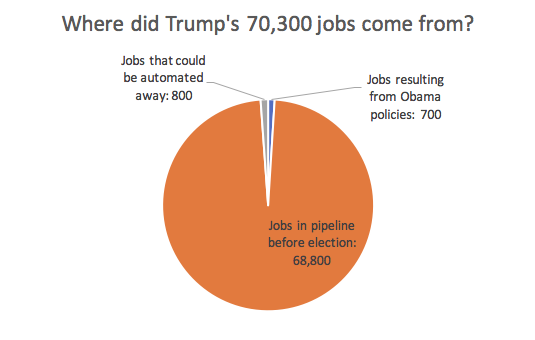By Brendan V. Duke
Trump took credit for creating or saving 70,300 jobs in his meeting with manufacturing CEOs on Thursday. But 68,800 of them were in the works before the election. And of the remaining 1,500, 700 were the result of Obama policies while many of the rest will disappear as the company invests in robots to replace the workers.
Let’s break it down.

68,800 jobs that were already in the pipeline
Trump took credit for announcements about jobs from Lockheed Martin (1,800 jobs), General Motors (7,000 jobs), Wal-Mart (10,000 jobs) and Japanese giant Softbank (50,000 jobs). The problem is that these jobs were already in the pipeline:
A Lockheed spokesperson said that the “new” jobs were linked to production increases that had been in motion for years.
A spokesperson for GM has stated that the jobs were “years in the making,” that “product development decisions are made well in advance,” and that “today’s announcement is no different.”
Wal-Mart made the announcement of the $6.8 billion capital investment that would lead to the new jobs in October — before the election.
Softbank also announced the creation of the fund that will make the investment in October, again before the election.
700 jobs from Obama policies
Trump also took credit for the 700 jobs that will result from a $700 million investment by Ford in its Flat Rock Assembly Plant in Michigan. The problem is that the investment is a result of President Barack Obama’s policies, not Donald Trump’s.
Ford will produce electric and hybrid cars at Flat Rock, the research for which was funded under the Obama Administration by the Department of Energy’s loan guarantee program. The program allowed Ford to borrow $5.9 billion in 2009 to do research on electric vehicles for production in the U.S. Ford’s investment in Flat Rock is the fruit of a policy that Republicans denounced as “venture socialism.”
Indeed, the continued existence of Ford itself is a result of the Obama Administration’s auto rescue, which Republicans opposed. Even though Ford did not receive money from the rescue, the collapse of GM and Chrysler “could’ve taken the entire supply base into free-fall” according to former Ford CEO Alan Mulally.
And 800 jobs that could disappear soon
That leaves the 800 jobs at the Carrier plant in Indiana that Trump claims to have saved.
The problem is that Carrier plans to invest in robots that will replace the humans whose jobs were “saved.” Indeed, the CEO of Carrier’s parent said “We’re going to…automate to drive the cost down so that we can continue to be competitive…what that ultimately means is there will be fewer jobs.”
Brendan V. Duke is the Associate Director for Economic Policy at American Progress Action Fund.